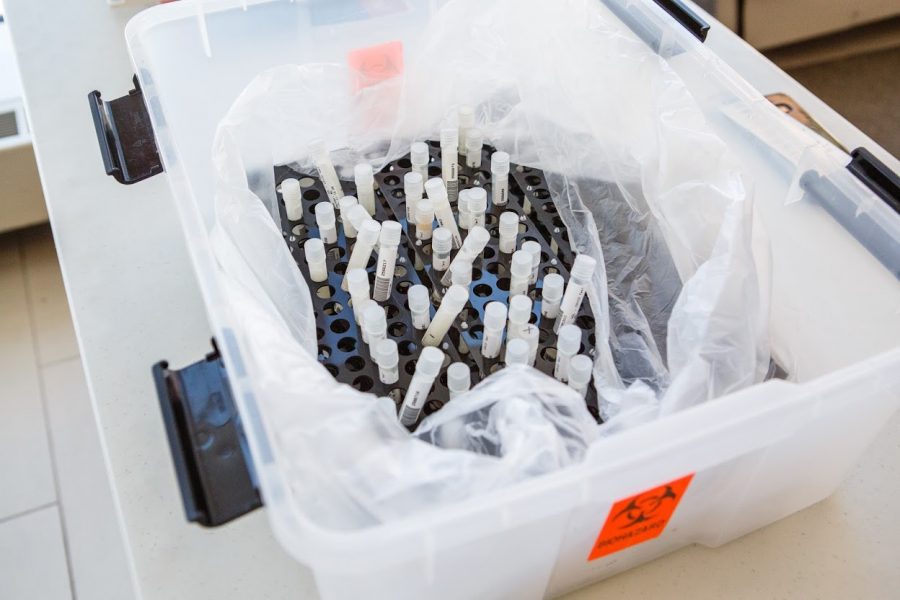COVID-19 variant stabilizes in campus, community during nationwide surge
Completed University COVID-19 tests await testing in a receptacle at the ARC on Feb. 1. Cases of the COVID-19 variant B117 are currently stable in C-U.
Mar 2, 2021
Cases of the COVID-19 variant B117 are currently stable in C-U, contrasting the nationwide exponential growth of the virus which is doubling every 10 days.
The B117 variant is known to be more contagious compared to other variants with 2,400 reported cases nationwide as of Sunday, according to the Centers for Disease Control and Prevention.
“In the next four to six weeks, there is an expectation that B117 may become the predominant strain in the U.S.,” Awais Vaid, deputy administrator of the Champaign-Urbana Public Health District, said.
Rebecca Smith, epidemiologist and co-leader of the SHIELD team, expects an increase in cases on campus as time goes on.
Since the start of the year, there have been 13 confirmed cases of the B117 variant on campus and 56 suspected cases. There are 67 reported cases of the B117 variant in Illinois total as of Sunday.
Get The Daily Illini in your inbox!
The campus daily sees about one to two suspected cases of the B117 variant, according to Nigel Goldenfeld, COVID-19 modeler for the University and professor in the college of Engineering.
Goldenfeld says the lack of a significant increase in cases is partially attributable to the “incredibly effective” surveillance testing that SHIELD does, due to quick test results and isolation of positive cases.
To test for B117, the SHIELD team must do sequencing. The team does not sequence every sample that comes through the lab, but instead monitors for S gene dropout. This pattern is present in B117 but also in other variants.
According to Smith, the number of S gene dropouts which are not attributable to B117 is “likely small enough not to matter,” so S gene dropouts are treated as suspect B117 cases.
“We know it’s here, we know to keep an eye on the S gene dropout,” Smith said. “We don’t need to know every single B.1.1.7 case at this point.”
Another variant on the CDC’s radar is the B1351 variant first detected in South Africa, of which Illinois has one reported case as of March 1.
“I am keeping an eye on B1351,” Smith said. “That one is of concern for me particularly because it’s associated with a potential increase in reinfections.”
Genotyping is required to test for the B1351 variant. This means sequencing the whole gene of the virus, as opposed to the University’s polymerase chain reaction test to analyze three particular regions of the virus.
Goldenfeld says the University may eventually consider setting up a systematic program of genotyping in the future, but it wouldn’t be useful as of now in stopping transmissions.
Vaid does not foresee Champaign County moving back to Phase 3 of the Restore Illinois plan in the short term.
In the long term, Vaid says it is dependent on how fast the county can vaccinate a large proportion of the population and how well people follow social distancing guidelines.
“We are providing vaccines better than any other county in the state of Illinois,” Vaid said.
This is due to strong community partnerships in which vaccine centers are well equipped and ready to vaccinate people.
Vaid says the CUPHD’s contact tracing team is able to identify cases and contacts within about 12 hours of receiving a lab result.
In taking additional precautions against spreading COVID-19, Smith recommends double masking to decrease the risk of transmission. Specifically, she recommends putting the disposable mask on first and then a fabric mask.
“The idea is that the disposable mask has better filtration and the cloth mask has better fit,” Smith said. “So by combining the two, you get the best of both worlds.”
Both the Moderna and Pfizer vaccines are effective against the B117 and B1351 variants.






